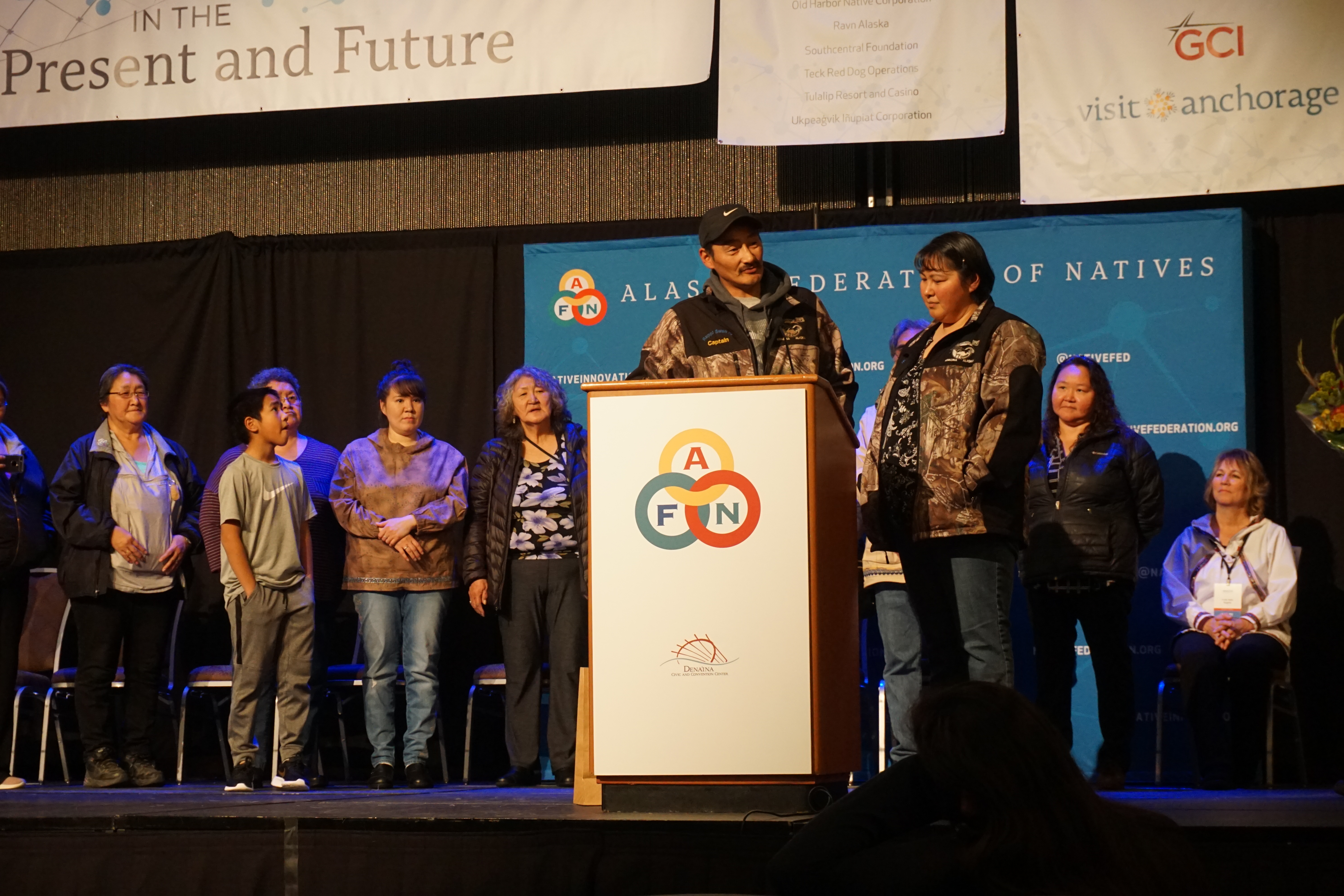A call to phase HFO out of the Arctic tops list of AFN recommendations
Several other resolutions also directly related to the Arctic.

In their annual convention in Anchorage, delegates to the Alaska Federation of Natives passed resolutions urging better protection of the Arctic marine environment, a stronger local say in how wetlands protections are applied to tundra and permafrost areas and new measures to ensure that Native people benefit from future economic development in the Arctic.
Those Arctic-specific items were among the nearly 30 resolutions passed on Saturday, the third and final day of the convention held each year by Alaska’s largest Native organization.
One resolution calls for a concerted effort to convince decision-makers to phase out the use of heavy fuel oil, or HFO, in Arctic waters. There is a ban on its use in Antarctic waters, but its use continues in Arctic waters even though the International Maritime Organization is discussing new limits in the far north at a meeting this week. Arctic waters off Alaska and those leading to the Arctic are vulnerable, the resolution says.
“Due to climate change, there is projected to be increased large vessel traffic in the Arctic and Bering Sea,“ it says. A spill of heavy fuel oil in those waters, home to 450 species of fish and to marine mammals like walruses and whales, would “harm subsistence resources, threatening food security, cultural practices , and local economies,” the resolution says. It also points to the air pollutants created caused by HFO combustion — substances like sulfur dioxide and black carbon that “pose a substantial risk to life.”
Another resolution calls for beefed-up state standards for cruise ship wastewater discharges. The resolution was submitted by the Metlakatla Indian Community at the southeastern tip of Alaska, far from the Arctic Circle — but if it results in any action, cruise ships traveling in the Arctic would be affected as well. The resolution notes that Alaska’s standards were relaxed by the state legislature in 2013, and that in the past two summers state environmental regulators have found coastal waters in areas trafficked by cruise ships to be polluted with excessive levels of fecal coliform. “Fecal contaminated coastal water threatens the pristine beauty and abundance of Alaskan waterways which tourists are drawn to,” the resolution says.
As traffic has increased, waste from a variety of types of ships has become a more serious problem in the northern Bering Sea and the Chukchi Sea north of the Bering Strait, according to a report by the Pew Charitable Trusts.
The resolution on wetlands “urges preservation of Alaska Native self-determination” in decisions about how development on wetlands will be conducted and regulated. Almost two-thirds of the nation’s wetland ecosystems lie in Alaska, and nearly half of the state could be classified as wetlands, the resolution notes. “Alaska Native landowners have the right to decide how to manage and preserve their lands,” it says.
Among the economics-related resolutions was one calling for a significant Native voice in the planning and potential construction of a North Slope natural gas pipeline. The Alaska Gasline Development Corp., the state agency sponsoring the proposal to build a project to ship liquefied natural gas to China, should work to ensure that Native people be hired and that Native landowners get “fair and equitable compensation for the use of their lands” and be protected from trespassers and development impacts.
Several of the resolutions — and much of the convention’s business — focused on violence against women and the inadequate responses to it from law enforcement agencies and the justice system.
The state’s new lieutenant governor devoted much of her keynote address to the subject.
Valerie Davidson, previously commissioner of the state Department of Health and Social Services, was sworn in as lieutenant governor on Tuesday, shortly after Byron Mallott abruptly resigned the post, apologizing for what the governor’s office said were “inappropriate comments” made to an unidentified woman.
“Respect for women and the dignity of all Alaskans is our responsibility,” Davidson said in her keynote address, delivered Thursday and received with three standing ovations.
She referred to hardships in her own life and in the lives of other women in her family, something she said ties her to women across Alaska.
“I want the women who are here today, who are at home in our communities to know that I see you. I see you. I know you. And I am you. As women, we weather the storms that life throws at us, sometimes completely out of our control. But we can make it through anything together,” she said.
Convention attendees also heard a progress report on resolutions passed last year, several of which concerned impacts of Arctic climate change.
Though there were fewer climate-related resolutions this year, warming conditions and reduced sea ice continued to be much discussed at the convention.
Replogle Swan Sr. of the Chukchi Sea village of Kivalina, raised the subject when he accepted this year’s Katie John Hunter-Fisher Award, bestowed by AFN on a subsistence food gatherer who is considered a role model.
“Life is getting harder,” Swan said. “The climate is changing.”
Yereth Rosen is a 2018 Alicia Patterson Foundation fellow.